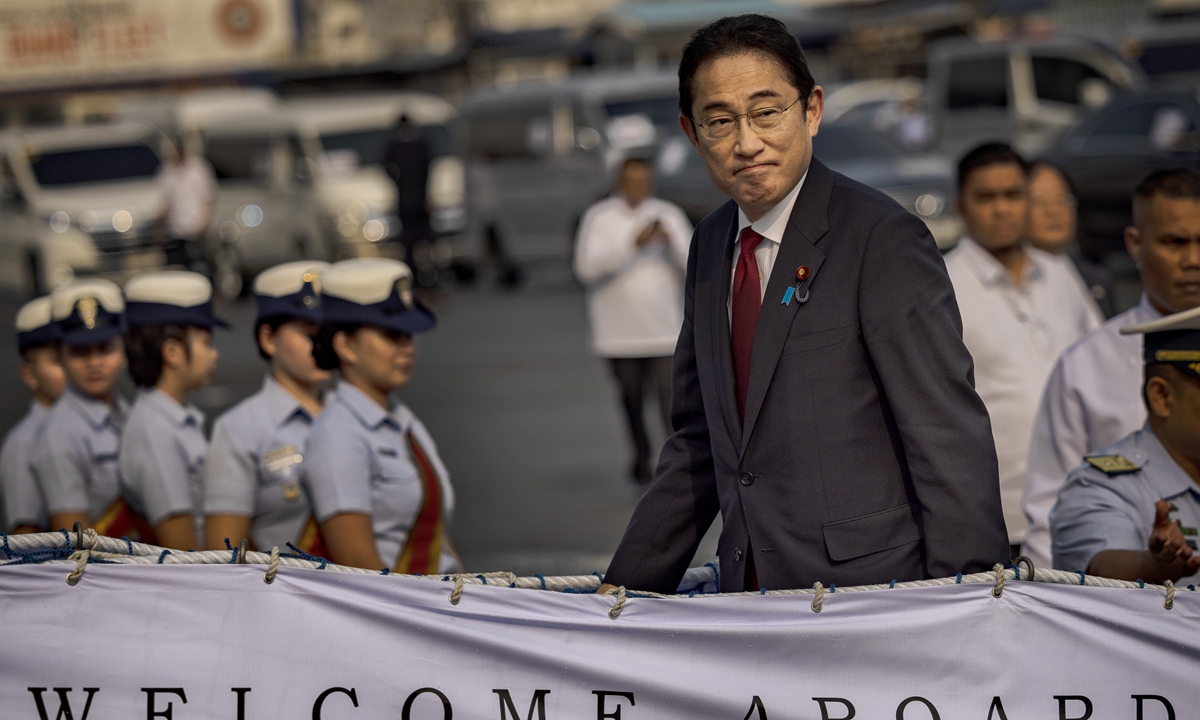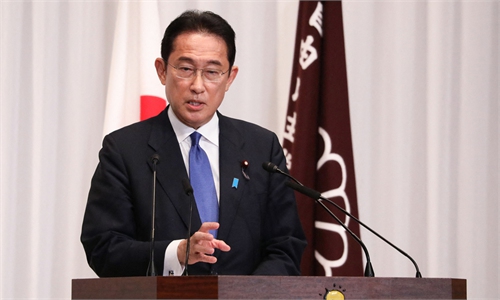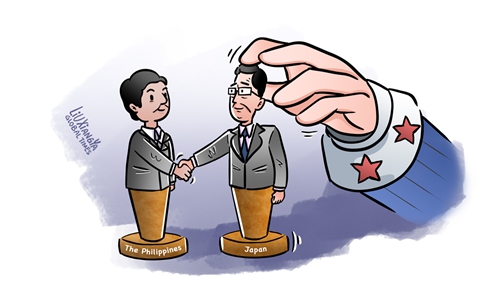
Japan's Prime Minister Fumio Kishida boards the BRP Teresa Magbanua ship at the Philippine Coast Guard headquarters on November 4, 2023, in Manila, Philippines. Photo: VCG
As Japanese Prime Minister Fumio Kishida met with Malaysian Prime Minister Anwar Ibrahim on Sunday after concluding his visit tothe Philippines and vowed to strengthen security cooperation with Malaysia, experts warned on Sunday that Japan's unilateral manipulation of Southeast Asia will not only exacerbate the divisions within the ASEAN bloc, but also escalate tensions in the South China Sea region.
Kishida met with Ibrahim at the Malaysian Prime Minister's office near the capital Kuala Lumpur for about two hours, according to NHK news. The two leaders agreed to promote bilateral diplomatic and security dialogue to tighten security cooperation.
They also confirmed that their countries should accelerate coordination for the use of Japan's new security assistance framework called the Official Security Assistance (OSA). According to Japan's design, the OSA aims to provide defense equipment to the armed forces of the so-called like-minded countries, which, in simpler terms, is military assistance.
Experts said that the first purpose of Kishida's visit to the Philippines and Malaysia this time is to extend what originally was foreign aid in the field of economy and trade to the construction of security capabilities and military modernization capabilities of the armed forces in conjunction with the two countries.
It can be seen that Kishida's visit to the Philippines and Malaysia is to make the two countries in the South China Sea region challenge China at a multilateral level and to manipulate these countries to slowly intervene in the Taiwan question, while helping the US select prospective members of an "Asian NATO," Da Zhigang, director of the Institute of Northeast Asian Studies at Heilongjiang Provincial Academy of Social Sciences, told the Global Times on Sunday.
Different from the Philippines, Malaysia and other ASEAN members have relatively stable relations with China, therefore such a unilateral manipulation will not only exacerbate the division of ASEAN, but also escalate tensions in the South China Sea region, Da warned.
Analysts said that at present, cooperation between Japan and Malaysia in the field of security is not institutionalized, but more of a verbal commitment by Japan to unilaterally promote its relations with ASEAN members. "There is no trend of concrete nor deepening cooperation between the two countries," Wang Guangtao, an associate research fellow with the Center for Japanese Studies at the Shanghai-based Fudan University, told the Global Times on Sunday.
Japan agreed on Friday to provide coastal radar systems worth 600 million yen ($4 million) to the Philippines as the countries deepen cooperation, according to Reuters, and these systems will be supplied under the OSA program.
Kishida said on Saturday that his country, the Philippines and the US are cooperating to protect the freedom of the South China Sea as he committed to help enhance Manila's security capabilities.
"In the South China Sea, trilateral cooperation to protect the freedom of the sea is under way," Kishida said in an address to the Philippine congress in the capital Manila.
During their talks, Kishida and Philippine President Ferdinand Marcos Jr. agreed to begin negotiations on a reciprocal access agreement (RAA), which would facilitate exchanges between Japan's Self-Defense Forces and the Philippine military.
If the two sides formally sign the RAA, it means that the entry procedures of the Japanese Self-Defense Forces will be simplified, and they can carry weapons and ammunition into the Philippines, experts noted. It is likely that regular bilateral military exercises between Japan and the Philippines will become more frequent.
As an association of regional countries, ASEAN has always played a central role in agenda-setting, including in the economic and political fields. The strengthening of military and security cooperation between key ASEAN members such as the Philippines and Malaysia and Japan is likely to undermine some of ASEAN's principles and centrality in regional security cooperation, Wang warned.


